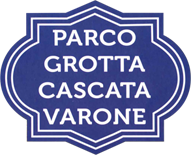Continuation: Varone Waterfall history, on Lake Garda
The official opening
Varone waterfall on Lake Garda was inaugurated amid great pomp on 20th June 1874, with a special guest of honour: Prince Nicholas of Montenegro, who happened to be holidaying by the lake in that period. It was a major event for the town of Riva del Garda, and was talked about for many years by its citizens.
From then on, every time there was some official engagement in Riva del Garda with a gala lunch in honour of the guests, it became customary before or after the lunch to slip in a visit to the Varone falls, for after all Varone was the pride of Riva del Garda or, at the very least, one of the best attractions in the area of northern Lake Garda.
VIP
The waterfall attracted the interest and admiration of artists and writers: Prince Umberto II, Gabriele D'Annunzio, Emperor Franz Joseph, Franz Kafka, Thomas Mann and a whole series of less famous writers and poets are just some of the people who have honoured the waterfall with a visit.
The emperor Franz Joseph of Hapsburg
The Emperor Franz Joseph, or “Cecco Beppe”, as he was affectionately called by the people of Riva del Garda which in that period was under the rule of the Austro-Hungarian Empire, was quite at home in this part of the world. The Emperor of Austria and King of Lombardy-Venetia (1830-1916), Franz Joseph often brought the imperial court with him on holiday in Arco, then a well-known resort and very popular with high society.
The history of the Austro-Hungarian Emperor is officially linked to that of the waterfall because Franz Joseph issued a certificate of merit to the then owner of the Varone falls: Piero Bozzoni. Bozzoni received the certificate because he had honoured the name of the Austro-Hungarian Empire by winning a special prize at the 1908 Milan Fair for the production of a particularly high quality silk (at that time growing mulberry bushes and keeping silk worms in order to make silk was common in Riva del Garda – Varone area).
Thomas Mann
Unlike Franz Kafka and the Brod brothers who visited Riva del Garda and the Varone waterfall more than once, but never mentioned the falls In their writings, Thomas Mann (1871-1950), the decadent German writer, included them in one of his best-known novels. He was often in Riva del Garda between 1901 and 1904, and in the winter of 1901 he visited the waterfall, and was strongly impressed by its spectacle. In his notebook he wrote the following notes, which 20 years later have found their way into one of his most famous novel “The Magic Mountain” (Die Zauerberg. 1924):
"At the bottom of the deep, narrow abyss of bulging bare rock, slippery like the huge bellies of fish, the flood of water crashed down with a deafening roar. Behind, above and all around could be heard threatening and warning calls, trumpets and the rough voices of men".
Towards the end of the novel, in the chapter which ends with the suicide of Mynheer Peeperkorn, a trip to the waterfall of Flüelatal is mentioned and the description of this waterfall is almost identical to the Varone falls.
Umberto II
All the newspapers talked about it and the photographs made the front page of the local papers: the sensational event was the visit in Riva del Garda in the summer of 1924 of the son of King Victor Emanuel III (the town had passed into Italian rule in 1919), the prince of Italy Umberto II, which was then just 20 years old. Six years later in 1930 he married Maria Jose of Belgium with whom he had four children. Umberto II was later King of Italy for just six months because in 1946, with the abolition of the monarchy in Italy and the declaration of the Republic, he was forced to leave the country and go into exile in Portugal.
Naturally during his visit on northern Lake Garda, young Umberto was taken immediately to visit the Varone waterfall, amid an explosion of flashing cameras. The photographs from the period show the prince with a boy's face and in uniform, climbing the steps to the waterfall accompanied by the local dignitaries.
Gabriele D’Annunzio
D'Annunzio, the great Italian poet, after a visit, was asked for his autograph and wrote "The man of the whirlwind and the water”.
